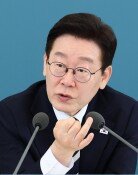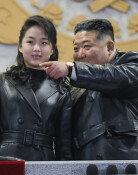Korea-U.S. summit reaffirms alliance
Korea-U.S. summit reaffirms alliance
Posted March. 08, 2001 13:14,
The Korea-U.S. summit between presidents Kim Dae-Jung and George W. Bush in Washington Thursday morning (Korean time) was particularly significant in that the two countries reaffirmed the solid alliance in their approaches to North Korea.
Bush placed major emphasis in the summit on overcoming fears that there would be conflicts between the two countries over their policies on North Korea. To this end, the U.S. president affirmed his support for the Korean government`s rapprochement policy and stressed the importance of South Korea`s role in resolving problems on the Korean peninsula.
For his part, President Kim looked to be successful in securing U.S. trust and support for the larger framework of Korea-U.S. allied relations and his North Korea policy. However, these positive outcomes were largely expected, the U.S. side having voiced its support for Seoul’s rapprochement policy toward Pyongyang during the foreign ministers` talks between Lee Joung-Binn and Colin Powell in Washington on Feb. 7.
The issue at hand is whether the two sides might express different views in the course of implementing concrete policy steps. It seemed that the first Kim-Bush summit did not allow sufficient leeway for fine-tuning opinions on the issues involved.
The U.S. has yet to fully organize its diplomatic team and so it has not yet unveiled its overall position on North Korea. The U.S. only received a briefing on South Korea`s policy position and was seen to have offered its basic support for Seoul`s stance.
Behind the U.S. emphasis on South Korea`s leading role in implementing policies on North Korea is Washington`s contention that South Korea is responsible for inducing North Korea to make substantial changes in line with U.S. views.
It is also encouraging that the two leaders, in evaluating the overall situation in Northeast Asia, including the Korean peninsula, reaffirmed their support for efforts to establish peace and stability here. The greater the agreement on the part of the two countries, the easier it will be to formulate and implement policies.
Bush said the U.S. would closely monitor North Korea to ascertain whether it was developing weapons of mass destruction, arguing that vigilance is essential to ensuring peace and stability in the East Asian region. His statement was interpreted to mean that the U.S. would examine the possibility of stepping up relations with North Korea only after verifying Pyongyang`s sincerity and assuring that changes in the North are genuine.
In short, despite the agreement on the overall framework for a joint North Korea policy, the two allies still face the uphill task of coordinating their approaches whenever new challenges arise.
Yun Seung-Mo ysmo@donga.com







